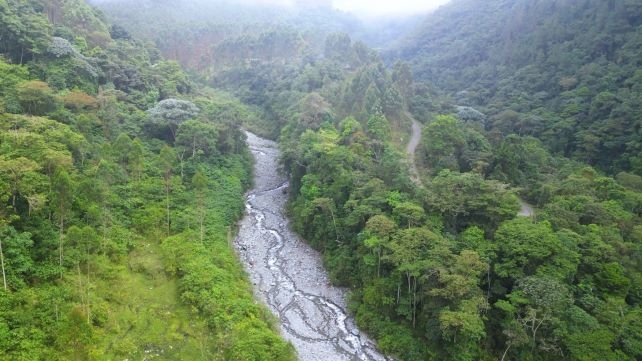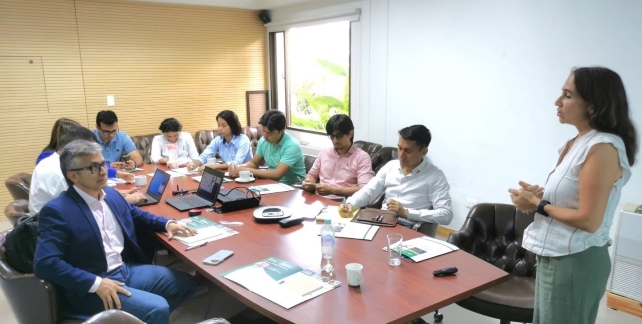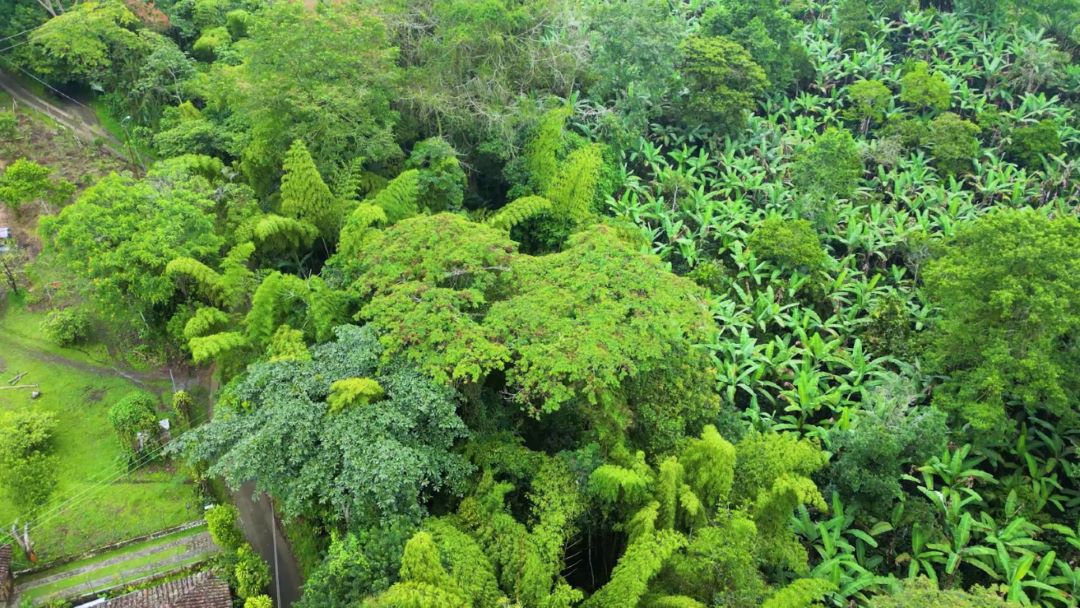REXUS brought together key institutional actors in Nima, Colombia, in a dedicated focus group meeting on 11 January 2024, to further promote the integration of Nature-based Solutions (NbS) into future management plans. NbS play a central role in the suite of tools offered to REXUS pilots, as sustainable solutions to cross-cutting Water-Energy-Food-Ecosystems Nexus challenges. A dedicated framework to evaluate them, the “REXUS Solution Selection Framework”, has been developed within REXUS.
The Nima river sub-basin in Colombia boasts an amazingly rich ecosystem, which faces intense demands from the food sector, and land use more generally, as well as the water and energy sectors. Chosen as a REXUS project pilot for the specific value that the Water-Energy-Food-Ecosystems Nexus approach can offer, Nima is a pilot area where Ecosystems must clearly play a central role. In Nima, ecosystems underpin the value of all economic activity, including agriculture, drinking water supply, and industrial plantations, such as tree plantations for paper production and sugarcane. It is therefore clear that any analysis which fails to account for the impact of these sectors on the ‘hidden’ economic value of ecosystems cannot lead to sustainable solutions. To safeguard ecosystem functioning, Nature-based solutions with their co-benefits, respect and support for natural processes, can be the most promising avenue for sustainable solutions.

The Nima sub-basin is blessed with upstream paramo and Andean ecosystems which boast rich biodiversity and endemic fauna and flora species, but faces intense environmental threats linked to the demands of the sectors of food (including land use) and water. Among others, lack of proper sewerage has been identified by stakeholders in REXUS workshops as a significant risk upstream in the Nima river, where waste is discharged untreated into the river, endangering the water supply of rural aqueducts managed by local communities. Furthermore, local industry, such as pine plantations for paper production and sugar cane plantations provide employment opportunities for some people, but also place a strain on water resources.
To advance the exploration of Nature-based Solutions as applied solutions in Nima, on 11 January 2024, REXUS pilot leader Alliance of Biodiversity & CIAT organized a focus group meeting at the Americas Hub of the Alliance of Biodiversity International & CIAT, together with REXUS partner Etifor. The meeting brought together key institutional stakeholders with technical expertise and authority in implementing management measures. These included several local decision makers, such as the Environmental Management Office of the Municipality, the regional Environmental Authority, the Chamber of Commerce, as well as Environmental authorities and NGOs. This meeting was the continuation of a REXUS’ ongoing dialogue and co-creation with local stakeholders, which already included three workshops and structured interviews, which performed a participatory mapping of Nexus interconnections and challenges, an exploration of potential cross-cutting solutions, as well co-designing a 10-year vision of future sustainability.

Marcela Beltran from CIAT, REXUS Nima pilot leader, summarizes REXUS findings so far and their relevance for the Nima sub-basin to key institutional stakeholders.
Following a presentation by Marcela Beltran from the of Alliance Biodiversity & CIAT on the progress of REXUS and its relevance to Nima, Juan Diego Restrepo from Etifor presented the results of a socio-economic assessment of implementing a management-type Nature-based Solution. This consisted in the restoration and conservation of forest cover through an ongoing Payment for Ecosystem Services (PES) scheme, an actual programme already being implemented and financed by the Municipality of Palmira. It aims to incentivize farmers to dedicate part of their land to conserve and restore native-species forests, to improve water quality for the basin, which provides freshwater for the municipality of Palmira.
Etifor’s presentation was part of a roll-out to all REXUS pilots of the “REXUS solution selection framework”, developed by REXUS partners UNEP-WCMC, Deltares, Etifor and the University of Padova. A practical step-by-step operational guide on how to identify, evaluate and integrate Nature-based and hybrid Solutions to address Nexus challenges, it aims to close the gap between theory and practice in NbS implementation.
In the analysis presented, the valuated ecosystem services for Nima were water flow regulation, water quality, water provisioning and food provisioning, with each service analyzed in its baseline scenario and then compared to the ‘NbS scenario’. Most importantly, the modeling demonstrated the logic of potential trade-offs that may arise among the different Nexus sectors, such as Ecosystems and Food, which can assist managers in making informed decisions.
While the exercise provided a provisional quantification of changes in the values of ecosystem services in the pilot area, due to data limitations, this quantification is illustrative rather than conclusive. However, it can be instrumental in guiding future excercises, such as a cost-benefit analysis of implementing Nature-based Solutions in the basin. The more accurate the data fed into the model, the more it will be able to accurately quantify the magnitude of the changes in the value of ecosystem services, and therefore inform decision making from an integrated management perspective.

Lively exchanges followed, with stakeholders providing additional insights on local data sources that can be integrated in the model to increase accuracy. Some stakeholders pointed out that the PES could not be applied in all of the examined areas, however they recognized the value of the analysis, which provides important backing for the value of this NbS solution.

